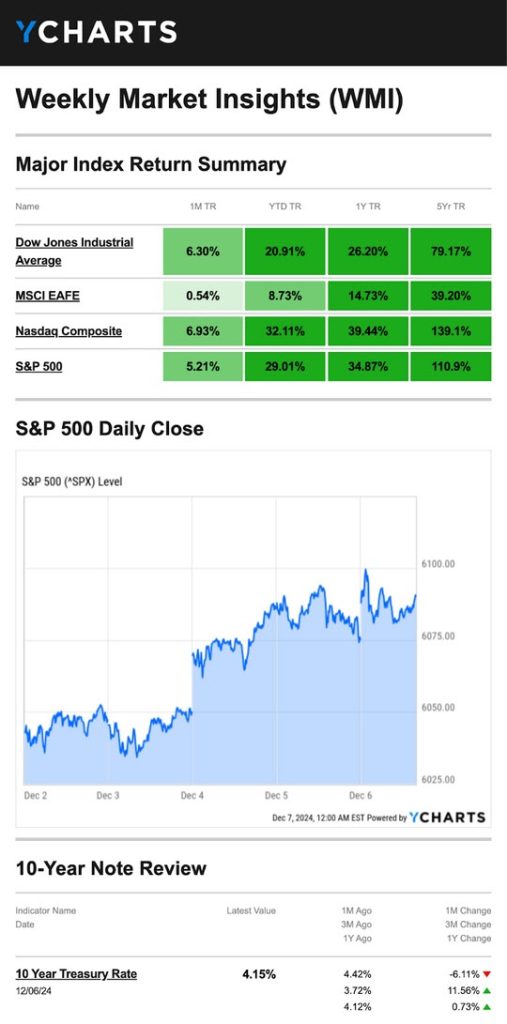By: Gerry Sparrow
Stocks were mixed during the first trading week of December. Technology stocks led, while the widely followed Dow Jones Industrial Average struggled.
The tech-heavy Nasdaq Composite Index picked up 3.34 percent while the Dow Industrials lost 0.60 percent. The Standard & Poor’s 500 Index added 0.96 percent. The MSCI EAFE Index, which tracks developed overseas stock markets, gained 1.46 percent.1,2
Tech Takes Charge
The S&P and Nasdaq rallied to start the week, closing at record highs Monday and Tuesday. The Dow fell on both days. During a conference speech, Fed governor Christopher Waller said he supports a rate adjustment in December for now, which seemed to add momentum to the S&P’s and Nasdaq’s gains.3,4
Tech shares continued to propel stock gains midweek on the strength of a few better-than-expected Q3 reports.5
On Friday, the S&P and Nasdaq hit new record highs following the November jobs report. Both notched their third consecutive winning week. By contrast, the Dow was down four of the five trading days, ending the week in the red after two back-to-back weekly gains.6,7,8


Source: YCharts.com, December 7, 2024. Weekly performance is measured from Monday, December 2, to Friday, December 6. TR = total return for the index, which includes any dividends as well as any other cash distributions during the period. Treasury note yield is expressed in basis points.
Jobs Rebound
After two hurricanes and an aircraft maker strike weighed on the labor market in October, the November jobs report released Friday gave investors what they were looking for: confirmation that the October update was an anomaly.
While November payrolls topped expectations, investors believed the hotter-than-expected report would not influence the Fed’s upcoming decision regarding short-term interest rates. The Fed’s scheduled two-day meeting ends on December 18.9
This Week: Key Economic Data
Tuesday: Productivity and Costs.
Wednesday: Consumer Price Index (CPI). 10-Year Treasury Note Auction. Treasury Statement.
Thursday: Weekly Jobless Claims. Producer Price Index (PPI). Fed Balance Sheet.
Friday: Import and Export Prices.
Source: Investors Business Daily – Econoday economic calendar; December 6, 2024
The Econoday economic calendar lists upcoming U.S. economic data releases (including key economic indicators), Federal Reserve policy meetings, and speaking engagements of Federal Reserve officials. The content is developed from sources believed to be providing accurate information. The forecasts or forward-looking statements are based on assumptions and may not materialize. The forecasts also are subject to revision.
Originally posted on December 10, 2024
PHOTO CREDIT: https://www.shutterstock.com/g/jamongdesign
VIA SHUTTERSTOCK
FOOTNOTES:
1. The Wall Street Journal, December 6, 2024
2. Investing.com, December 6, 2024
3. CNBC.com, December 2, 2024
4. MarketWatch.com, December 3, 2024
5. CNBC.com, December 4, 2024
6. MarketWatch.com, December 5, 2024
7. MarketWatch.com, December 6, 2024
8. The Wall Street Journal, December 6, 2024
9. The Wall Street Journal, December 6, 2024
DISCLOSURES:
Investing involves risks, and investment decisions should be based on your own goals, time horizon, and tolerance for risk. The return and principal value of investments will fluctuate as market conditions change. When sold, investments may be worth more or less than their original cost.
The forecasts or forward-looking statements are based on assumptions, may not materialize, and are subject to revision without notice.
The market indexes discussed are unmanaged, and generally, considered representative of their respective markets. Index performance is not indicative of the past performance of a particular investment. Indexes do not incur management fees, costs, and expenses. Individuals cannot directly invest in unmanaged indexes. Past performance does not guarantee future results.
The Dow Jones Industrial Average is an unmanaged index that is generally considered representative of large-capitalization companies on the U.S. stock market. Nasdaq Composite is an index of the common stocks and similar securities listed on the NASDAQ stock market and is considered a broad indicator of the performance of technology and growth companies. The MSCI EAFE Index was created by Morgan Stanley Capital International (MSCI) and serves as a benchmark of the performance of major international equity markets, as represented by 21 major MSCI indexes from Europe, Australia, and Southeast Asia. The S&P 500 Composite Index is an unmanaged group of securities that are considered to be representative of the stock market in general.
U.S. Treasury Notes are guaranteed by the federal government as to the timely payment of principal and interest. However, if you sell a Treasury Note prior to maturity, it may be worth more or less than the original price paid. Fixed income investments are subject to various risks including changes in interest rates, credit quality, inflation risk, market valuations, prepayments, corporate events, tax ramifications and other factors.
International investments carry additional risks, which include differences in financial reporting standards, currency exchange rates, political risks unique to a specific country, foreign taxes and regulations, and the potential for illiquid markets. These factors may result in greater share price volatility.
Please consult your financial professional for additional information.
This content is developed from sources believed to be providing accurate information. The information in this material is not intended as tax or legal advice. Please consult legal or tax professionals for specific information regarding your individual situation. This material was developed and produced by FMG Suite to provide information on a topic that may be of interest. FMG is not affiliated with the named representative, financial professional, Registered Investment Advisor, Broker-Dealer, nor state- or SEC-registered investment advisory firm. The opinions expressed and material provided are for general information, and they should not be considered a solicitation for the purchase or sale of any security.




